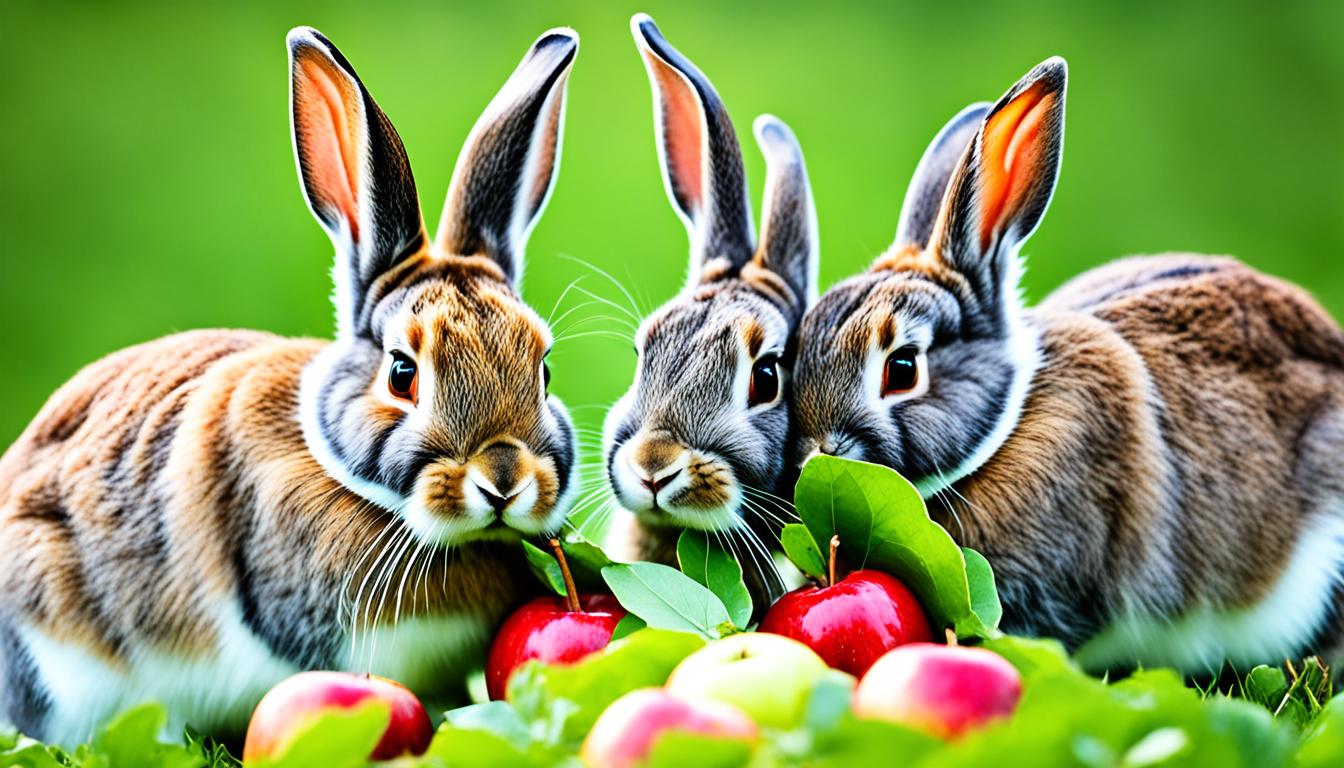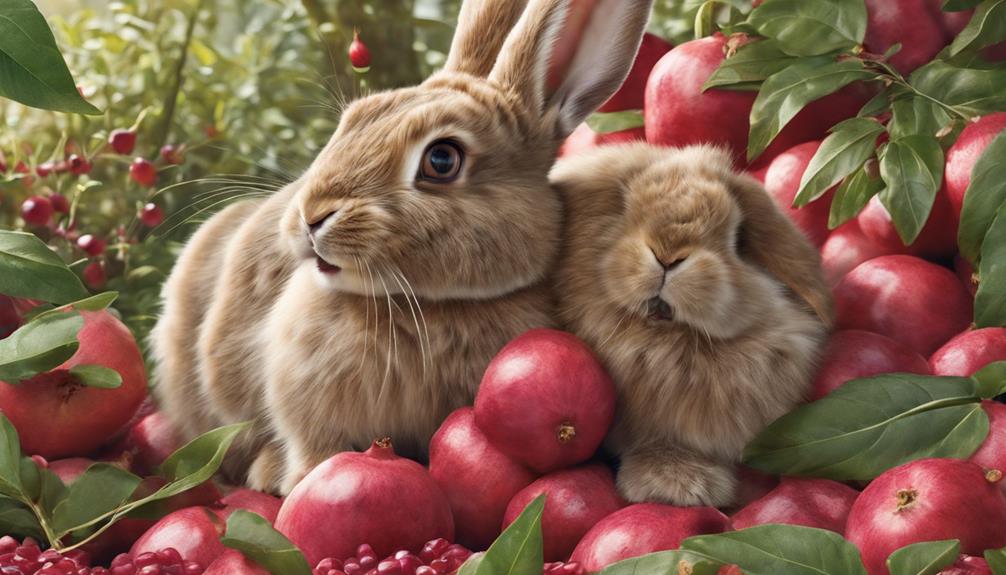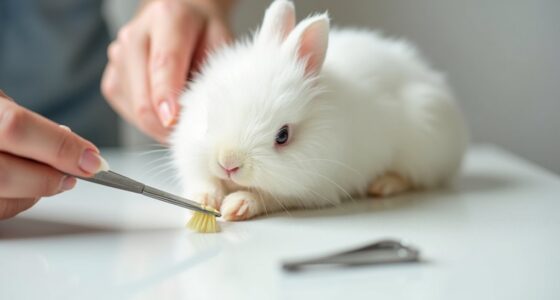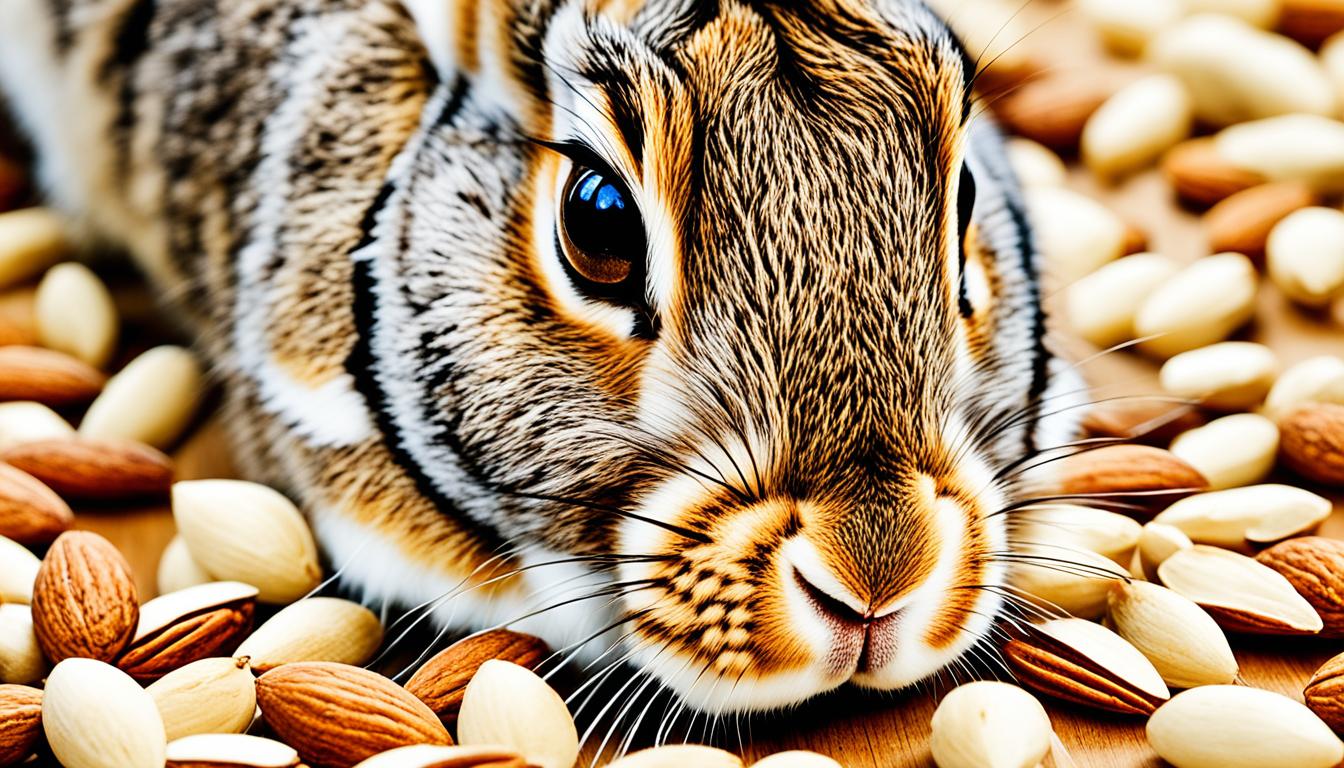Did you know that mushrooms can be harmful to rabbits? Despite being herbivores, not all foods are safe for their delicate digestive systems. Mushrooms actually contain toxins that can make rabbits very sick or even lead to death. It is essential to make sure rabbits have a safe and suitable diet to keep them healthy and happy.
Key Takeaways:
- Mushrooms should never be fed to rabbits as they can be toxic and harmful.
- Rabbits have unique dietary requirements and not all foods are suitable for them.
- Safe diets for rabbits include a constant intake of high-quality hay, as well as small amounts of safe fruits and vegetables as treats.
- Avoid feeding rabbits foods that are known to be toxic or harmful, such as mushrooms, and introduce new foods gradually to prevent digestive upset.
- By providing a safe and balanced diet, you can ensure the health and well-being of your furry friend.
Why Are Some Foods Inappropriate for Rabbits?
Rabbits have unique dietary requirements due to their specialized digestive tracts. Many foods that humans enjoy, as well as some foods marketed for rabbits, can be inappropriate and lead to serious health concerns if consumed. It is important to be aware of these inappropriate foods to ensure the well-being of our furry friends.
Dangerous Foods for Rabbits
Here are some examples of foods that should never be fed to rabbits:
- Avocados: Avocados contain persin, which is toxic to rabbits and can cause digestive issues and heart problems.
- Chocolate: Chocolate contains theobromine, which is poisonous to rabbits and can lead to heart and nervous system problems.
- Fruit seeds and pits: Seeds and pits from fruits like apples, peaches, and cherries can be choking hazards and cause intestinal blockages.
- Raw onions and garlic: Onions and garlic can cause gastrointestinal irritation and damage red blood cells in rabbits.
- Meat and eggs: Rabbits are herbivores and their digestive systems are not designed to process meat or eggs.
- Dairy: Rabbits lack the enzymes required to digest lactose, making dairy products unsuitable for them.
- Broad beans and kidney beans: These beans contain toxins that can be harmful to rabbits.
- Rhubarb: Rhubarb leaves contain oxalic acid, which can cause kidney damage and other health issues in rabbits.
- Iceberg lettuce: Iceberg lettuce has little nutritional value and can cause diarrhea and digestive problems in rabbits.
- Mushrooms: Mushrooms contain toxins that can be harmful to rabbits and may lead to severe illness or even death.
- Houseplants: Many common houseplants are toxic to rabbits and should be kept out of their reach.
- Processed foods: Bread, pasta, cookies, crackers, chips, and other processed foods are high in carbohydrates and can lead to obesity and digestive issues in rabbits.
- Raw potatoes: Raw potatoes contain solanine, which is toxic to rabbits and can cause digestive problems.
“It is crucial to avoid feeding rabbits any foods that are known to be toxic or harmful, as inappropriate foods can cause various health problems and even be toxic to rabbits.”
By being mindful of what foods are inappropriate for rabbits, we can help protect their health and prevent potential health issues. It is always best to consult with a veterinarian if you have any doubts about the suitability of a specific food for your rabbit.
Foods Inappropriate for Rabbits
| Foods | Reasons |
|---|---|
| Avocados | Toxic to rabbits, can cause digestive and heart problems |
| Chocolate | Contains theobromine, poisonous to rabbits, can cause heart and nervous system problems |
| Fruit seeds and pits | Choking hazards, can cause intestinal blockages |
| Raw onions and garlic | Can cause gastrointestinal irritation, damages red blood cells |
| Meat and eggs | Rabbits are herbivores, their digestive systems are not designed for meat or eggs |
| Dairy | Rabbits lack enzymes to digest lactose |
| Broad beans and kidney beans | Contain toxins harmful to rabbits |
| Rhubarb | Oxalic acid can cause kidney damage and other health issues |
| Iceberg lettuce | Low nutritional value, can cause diarrhea and digestive problems |
| Mushrooms | Contains toxins, can be harmful or even fatal |
| Houseplants | Many houseplants are toxic to rabbits |
| Processed foods | High in carbohydrates, can cause obesity and digestive issues |
| Raw potatoes | Contain solanine, toxic to rabbits, can cause digestive problems |

It is important to exercise caution when providing food to our rabbits and ensure that their diets consist of safe and appropriate foods. By avoiding inappropriate foods, we can keep our rabbits healthy and thriving.
The Dangers of Mushrooms for Rabbits
Rabbits should never be fed mushrooms, whether they are store-bought or wild. Mushrooms contain toxins that are harmful to rabbits and can lead to severe illness or even death. This makes them a dangerous and unsuitable food choice for our furry friends.
Wild mushrooms, in particular, pose a significant risk to rabbits. Many species of wild mushrooms are toxic to rabbits and can cause various health problems, including digestive issues and liver damage. It’s essential to keep rabbits away from any wild mushrooms they may encounter.
Even cultivated mushrooms can be potentially harmful to rabbits. Some cultivated mushrooms may contain mycotoxins, which are toxic substances produced by fungi. If rabbits ingest these mycotoxins in large quantities, it can have detrimental effects on their health.
To ensure the safety of rabbits, it is best to avoid feeding them any type of mushroom. Instead, we should focus on providing them with a diet that consists of safe and appropriate foods.

“Mushrooms should never be fed to rabbits as they can be toxic and harmful to their health.”
Safe Diets for Rabbits
The well-being of our beloved rabbits depends greatly on providing them with a safe and healthy diet. The primary components of a rabbit’s diet should consist of high-quality hay, a variety of fruits, and vegetables. Let’s take a closer look at what constitutes a safe and nutritious diet for our furry friends.
Hay: The Foundation of a Rabbit’s Diet
Hay serves as a crucial component of a rabbit’s daily diet. It provides essential fiber necessary for proper digestion and helps maintain dental health. The most commonly recommended types of hay for rabbits are oaten hay, timothy hay, and lucerne hay. These hays are widely available and suitable for rabbits of all ages.
When feeding your rabbit hay, ensure it is clean, fresh, and free from mold or dust. A constant supply of hay should be available to your rabbit at all times, as it aids in promoting healthy digestion and prevents dental issues.
Fruits and Vegetables as Nutritious Treats
In addition to hay, rabbits can enjoy small portions of fruits and vegetables as treats. These healthy snacks provide essential vitamins and minerals, adding variety to their diet. It’s important to note that fruits and vegetables should only be introduced gradually and in appropriate amounts to prevent digestive upset.
When selecting fruits and vegetables for your rabbits, opt for safe options that are low in sugar and suitable for their delicate digestive systems. Here are some examples of rabbit-friendly produce:
- Leafy green vegetables like arugula, basil, beet greens, bell peppers, carrots, celery, cilantro, dandelion greens, and more
- Safe fruits such as apples, apricots, blueberries, cherries, kiwis, mangoes, melons, oranges, papayas, and more
Remember to wash all fruits and vegetables thoroughly before offering them to your rabbits, and remove any seeds or stems that may pose a choking hazard.
| Fruits | Vegetables |
|---|---|
| Apples | Arugula |
| Apricots | Basil |
| Blueberries | Beet greens |
| Cherries | Bell peppers |
| Kiwis | Carrots |
| Mangoes | Celery |
| Melons | Cilantro |
| Oranges | Dandelion greens |
| Papayas |

Image: Safe Diets for Rabbits
Keep in mind that while fruits and vegetables are nutritious, they should only be provided as treats and not exceed 10% of a rabbit’s daily caloric intake. The majority of their diet should still consist of hay to meet their essential nutritional needs.
By incorporating high-quality hay, safe fruits, and vegetables into your rabbit’s diet, you can ensure their overall health and well-being. Remember to consult with a veterinarian for specific dietary recommendations based on your rabbit’s age, breed, and any underlying health conditions.
Foods to Avoid and Moderation
While there are many safe fruits and vegetables for rabbits, it’s important to be aware of the foods that should be avoided or fed in moderation. Some foods can be harmful or have little nutritional value for rabbits, leading to health issues. Here’s a list of foods to avoid and some that should be given in moderation:
Foods to Avoid:
- Avocado
- Corn
- Legumes (beans and peas)
- Iceberg lettuce
- Onions
- Potatoes
- Rhubarb
- Wild-grown mushrooms
- Oats
These foods can be harmful to rabbits or may not provide the necessary nutrients they need for a balanced diet. It is best to avoid feeding these foods to your furry friends.
Foods to Give in Moderation:
- Bananas
- Chard
- Flowering vegetables like cauliflower and broccoli
- Broccoli stems and leaves
While these fruits and vegetables are generally safe for rabbits, they should be served in limited quantities. They can have high sugar content or cause gas, which may lead to digestive upset or other health problems if given in excess.
Remember, always consult with a veterinarian for specific dietary recommendations for your rabbit. Each rabbit is unique, and certain health conditions may require additional dietary restrictions. By providing a safe and balanced diet, you can ensure the optimal health and well-being of your furry friend.
How to Integrate Fruits and Vegetables into Your Rabbit’s Diet
When it comes to integrating fruits and vegetables into your rabbit’s diet, it’s important to approach it gradually and with care. By following these steps, you can ensure a smooth transition and a balanced diet for your furry friend:
- Start with Grass Hay: Before introducing any new foods, provide your rabbit with a diet of high-quality grass hay for at least two weeks. This will help prepare their digestive system for the upcoming changes.
- Introduce Leafy Green Vegetables: Choose one type of leafy green vegetable at a time and introduce it slowly. Monitor your rabbit’s response and adjust the quantity accordingly. Offer approximately 1 cup of packed leafy greens per 2 pounds of your rabbit’s body weight.
- Monitor Fruit Intake: Similar to vegetables, introduce fruits gradually. Start with one type at a time and observe your rabbit’s stool for any negative reactions. Limit the daily serving of fruits to approximately 1 leveled tablespoon per 2 pounds of body weight.
- Washing and Preparation: Before serving fruits and vegetables to your rabbit, ensure they are thoroughly washed to remove any dirt or pesticides. Additionally, remove any seeds or stems that may not be safe for your rabbit to consume.
- Hydration and Access to Hay: Alongside fruits and vegetables, it is essential to provide your rabbit with fresh water at all times. Additionally, ensure they have constant access to hay, which is an essential component of their balanced diet.
By following these steps, you can successfully integrate fruits and vegetables into your rabbit’s diet and provide them with a varied and nutritious meal plan. Remember to monitor your rabbit’s response to new foods and make adjustments as necessary.
Safe Fruits and Vegetables for Rabbits
| Fruits | Serving Size |
|---|---|
| Apples | 1-2 tablespoons |
| Bananas | 1-2 tablespoons |
| Blueberries | 1-2 tablespoons |
| Cherries | 1-2 tablespoons |
| Melons | 1-2 tablespoons |
| Vegetables | Serving Size |
|---|---|
| Arugula | 1 cup |
| Carrots | 1 cup |
| Celery | 1 cup |
| Dandelion Greens | 1 cup |
| Spinach | 1 cup |
Remember to introduce new fruits and vegetables gradually, and always prioritize your rabbit’s health and well-being. By offering a balanced diet that includes a variety of safe and appropriate foods, you can ensure the longevity and happiness of your furry companion.

Conclusion
In conclusion, it is crucial to prioritize a safe and appropriate diet for rabbits to ensure their health and well-being. Mushrooms should never be fed to rabbits as they can be toxic and harmful. It is important to avoid feeding rabbits any foods that are known to be toxic or have little nutritional value, such as mushrooms, onions, and raw potatoes.
Rather, rabbits should have a constant intake of high-quality hay to ensure their digestive health. In addition, small amounts of safe fruits and vegetables can be offered as treats. Leafy green vegetables like arugula, bell peppers, and carrots, as well as fruits like apples and blueberries, are good choices for rabbits.
By providing a safe and balanced diet, we can ensure the health and well-being of our furry friends. Remember to introduce new foods gradually and monitor your rabbit’s response. With proper care and attention to their dietary needs, rabbits can thrive and live happy, healthy lives.









